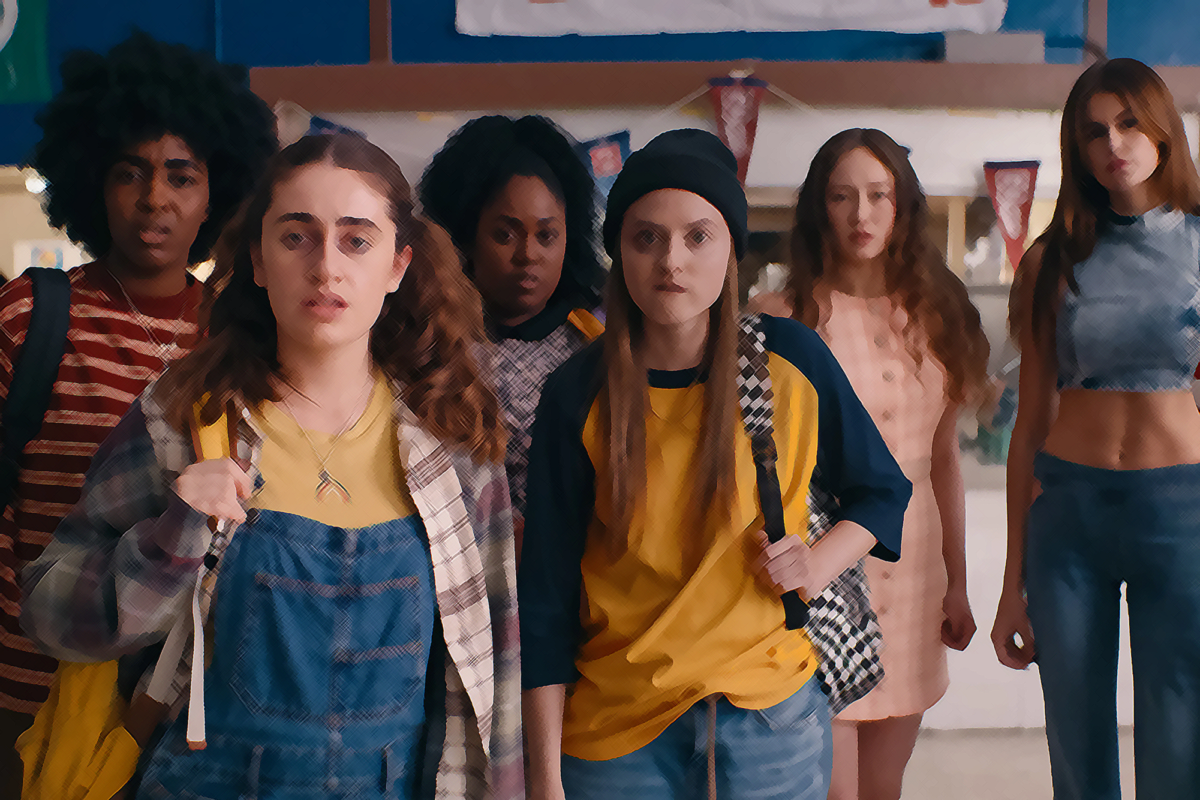“Bottoms,” a satirical teen comedy written by Emma Seligman and actress Rachel Sennott, came to theaters on Friday, Aug. 25 and is quickly becoming a queer favorite through positive representation, campy humor and its mockery of the teen sex comedy.
“Bottoms” follows two lesbian highschoolers, PJ and Josie, played by Rachel Sennott and Ayo Edebiri from “The Bear,” as they set up a fight club to get closer to their popular crushes — an absurd premise that immediately grabbed me. At its core, “Bottoms” is an utterly hilarious coming-of-age story, but it is so much more than others in its genre. Beneath the film’s thick layers of satire and playfulness lie kernels of much deeper themes like queer expression and gender politics that films before it have lacked. In this way, it combats the inherently problematic nature of the raunchy teen comedy genre.
Hollywood’s teen sex comedy genre has been around for decades, seen in films like “Superbad” and “American Pie,” hallmarked by cringy coming-of-age plots. In this chaotic canon, ridiculous premises are crucial and the worlds in these films are often exaggerated versions of our own. Yet, with plenty of absurdities, this genre has been a cult-favorite since its widespread explosion in the 1980s, standing the test of time and being relatable to any generation –– for the most part.
While the raunchy teen comedy still has many relatable elements today, the genre has not aged well within the context of modern culture. Since its inception, films within this canon often centered solely on male protagonists as they do anything to “get the girl,” celebrating and, in turn, perpetuating misogyny. Modern filmmakers have been challenged with the difficult but necessary task of expanding the teen sex comedy for our current time to become more inclusive, and therefore, more relatable. While some have successfully done this, “Bottoms” makes up for the lack of queer storytelling in Hollywood, reconstructing the teen sex comedy genre as we know it.
“Bottoms” is a queer movie that’s actually for queer people. Until recently, films based around the queer experience have fallen flat, with almost every storyline focusing on a character’s experience with coming out or bullying due to their identity. While understanding these very real issues are important to representation, it is also very problematic to only frame queer people within this lens, as it equates individuals to their struggle, leaving out the diversity of queer experiences and true identity. “Bottoms” doesn’t rely on these tropes at all. Seligman’s careful crafting of queer voices is open and judgment-free, creating powerful representation that makes it stand out.
By putting deeper meanings like queer experiences and gender roles underneath layers of satire, rather than making them the focus, “Bottoms” effectively turns the teen sex comedy on its head and creates a subtle piece of nuanced social commentary. After seeing it in theaters, a critic from The New Yorker actually condemned the film for being too playful, saying that the film “hardly bothers with character development” and has “casual indifference to matters of sexuality and gender that passes for untroubled tolerance.” This misses the point of the film, which is a comment on the problematic behaviors that are celebrated in straight, male-centered media.
Every aspect of the plot in “Bottoms” is central to this mockery. From the beginning, PJ and Josie are depicted as completely selfish, wanting nothing more than sex and popularity without caring about whom they hurt along the way — just like their male predecessors. This is entirely purposeful; in past teen sex comedies, straight male characters have always acted this way, rarely condemned for their harmful behaviors towards women. By making these queer, female characters engage in the same wrong behaviors that straight male characters have acted out forever, “Bottoms” plays into our own expectations of gender roles, showing how quick we are to excuse harmful behavior when it is perpetrated by men.
“Bottoms” is a feat of queer storytelling, commenting on the patriarchal and heteronormative nature of the film industry and American society itself. Streaming on Amazon Prime Video now, the satire manages to fight sexist tropes with ease, truly packing a punch for the teen sex comedy genre.



